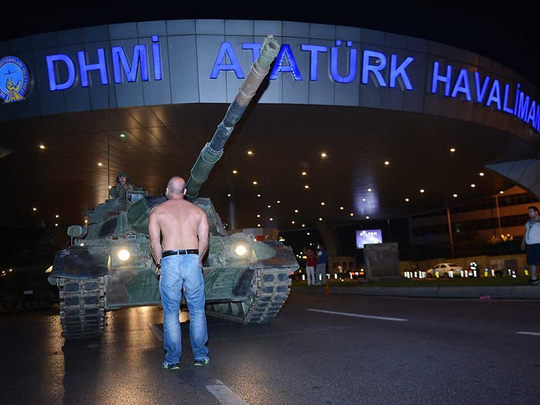
The recent failed coup attempt in Turkey highlights the country’s continuing vulnerability to military takeovers. But it also reveals a newly-developed — and highly potent — asset, one that Turkey’s neighbours should also seek to cultivate: A strong middle class willing and able to mobilise against extremist threats. The question for Turkey now is whether President Recep Tayyip Erdogan will cultivate this asset. For the wider Middle East, the issue is how to build a middle class that can safeguard stability.
When throngs of citizens took to the streets of Istanbul in the middle of the night, in an effort to push back the military coup-makers, it was a powerful show of collective action — one that should interest any political leader, particularly those seeking to develop their countries. Analysis of the coup has tended to focus on the rivalries within the Turkish elite, and on Erdogan’s failings (which, to be sure, are plentiful). But little has been said about the structural shifts in Turkey’s political economy that have empowered the country’s middle classes, which form the electoral base of Erdogan’s Justice and Development Party (AKP).
Over the past two decades, Turkey has made remarkable economic strides, transforming itself from Europe’s “sick man” into one of its most vibrant economies and a new centre of gravity for trade in the Middle East. Critical to this transformation have been infrastructure investment, support for medium-sized firms, expansion of regional trade and development of its tourism sector.
As a result of these efforts, Turkey’s per capita income has tripled in less than a decade, while its poverty rate has more than halved, according to World Bank estimates. This has underpinned tremendous economic mobility among Turkey’s rural labour force, small entrepreneurs and lower-income workers, pushing masses of people from the margins of society into the mainstream. Even foreign policy was, wherever possible, aligned with the economic interests of the rising middle class (though the Syrian intervention reflects a shift in foreign-policy priorities).
For Turkey’s new middle class, the survival of democracy could not be more important — and, as recent events have shown, they are willing to fight for it. Indeed, what has occurred in Turkey does not reflect only a power struggle between Erdogan and his challengers; it also highlights the determination of the middle class to ensure that Turkey does not revert to a political system that would damage its economic and political fortunes.
All of this suggests that, in responding to the coup attempt, Erdogan and his supporters must think beyond punishing the military faction that carried it out, though that is, of course, critical. They must also focus on strengthening the interests of the middle class that came to the government’s defence.
In this sense, the real challenge facing Turkey in the coming months and years will not be from the military or foreign conspirators. Succumbing to the temptation to consolidate power in the hands of the president, ostensibly to protect his government’s authority, could limit checks and balances and restrict space for political opposition, including within his own party. That would undermine the very system for which the middle class has been fighting.
Of course, Erdogan does need to consolidate his political base, including by renewing ties with loyal supporters. And purging the military and civilian bureaucracy of possible coup supporters would undoubtedly please party loyalists. But he must also heal the political rift and forge a new consensus that supports economic prosperity.
Perhaps most important, the AKP needs to halt the dangerous unravelling of the Turkish model of regional economic integration, based on the policy of “zero problems with neighbours”, originally conceived by former prime minister Ahmed Davutoglu, but rolled back in recent years. Turkey has severed ties with virtually all of its immediate Middle Eastern neighbours. The recent souring of diplomatic ties with Russia has further weakened Turkey’s position. In the process, Turkey’s status as a model Muslim democracy has gradually deteriorated and political polarisation has deepened, amid growing threats to the country’s stability.
None of this is good for the economy on which Turkey’s middle class — and, in turn, the AKP’s electoral success — depends. That provides reason to hope that the failed coup, by highlighting the role of the middle class as a bulwark against military rebels, will spur Erdogan’s government to resolve Turkey’s political impasse and ensure economic growth. Turkey’s middle class will not support a party that fails to advance its interests and deliver economic prosperity. But an AKP that returns to its foundational vision of enabling economic mobility — that is another story.
Importantly, as Erdogan seeks to concentrate more powers in the office of the President, he would do well to remind himself of the conditions that led to the Ottoman Empire’s emergence and its eventual collapse. Much like the AKP’s rise, the empire’s was based on the support of an emancipated citizenry in the rural countryside, particularly in the Anatolian heartland. But, upon consolidating their power in Constantinople, Ottoman rulers quickly moved towards establishing a Sultanic order that contradicted its progressive origins — and weakened it from within. With greater centralisation of powers, Ottoman rulers became uncomfortably dependent on notables at home and imperial powers in Europe.
If Erdogan’s AKP hopes to avoid a similar fate, it must not continue its march towards a latter-day Sultanic order. A prosperous and inclusive democracy is the only way out for Turkey, and it would restore a model that the countries of the wider Middle East desperately need.
— Project Syndicate/ Mohammed Bin Rashid Global Initiatives, 2016
Adeel Malik is Globe Fellow in the Economies of Muslim Societies at the University of Oxford.










